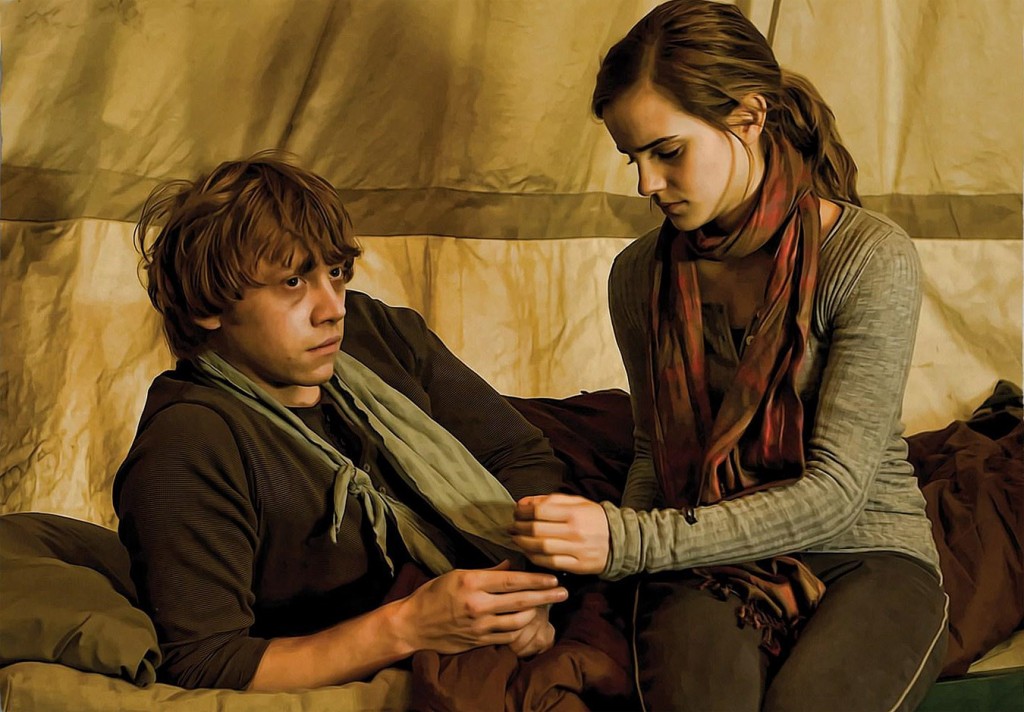
See, this is exactly why I love culture-wide book clubs. I mention Harry Potter in passing, and you all start discussing the proper nature of love, and whether Ron/Hermione or any of the other case studies we’re all quite familiar with from the series, fit the mold.
I said that one of the reasons I hate the Ron/Hermione pairing is that Ron has, at best, apathy and at worst contempt for Hermione’s curiosity and brightness. I didn’t she, or anyone else, should you marry someone who didn’t care for what she loved to do. Dan F was surprised by my vehemence and wrote:
When you love someone, everything they do/are/interested in becomes interesting but only through that love. For example, my wife is interested in the show “Say Yes to the Dress”. On my own, I can’t stand it but if she is watching and commenting I can easily get pulled into discussion about various aspects of dress design/fit/cost/family dynamics/etc. and I find myself being interested, just for the moment, in that interest.
…I guess my point is that love, from the most basic form of seeing your opponent as human to the full commitment of marriage, as an act of the will, leads to respect, interest, etc. Those things might come first (before love) but they certainly will follow.
KL also came to Ron’s defense. When I complained that Ron only valued Hermione’s intelligence instrumentally, but didn’t appreciate intellectual curiosity as an end-in-itself, contemplating the mind of God kinda thing, KL wrote:
[T]here is a difference between appreciating someone else’s values in and of themselves and appreciating them simply because the other person takes delight in them. I think you can be a good partner so long as you have the latter, with the former a nice bonus but not strictly necessary. My fiance doesn’t really understand why ten-part choral arrangements move me to tears, but he appreciates that I am moved and encourages me to go to choral performances. I see Ron’s journey as a gradual coming-to-appreciate Hermione’s values because he cares for her, which I think speaks well of him precisely because he doesn’t share those values affectively. It wouldn’t be as noteworthy if he, too, were naturally intellectual; rather, part of his maturing as a person comes in recognizing and valuing that which is foreign and Other to him.
I think there’s a difference between how the lover should respond to some of the incidental interests of the beloved and how they should respond to their virtues. It’s perfectly all right if someone setting their cap for me is indifferent to sewing and costuming. Dan F’s response is entirely appropriate here; you might take pleasure in my pleasure, but it’s not necessary to pick up a bobbin yourself. You’re still obligated to help me hold something together for a fitting or listen to me burble on with excitement when something comes together, but there’s no need for you to adopt costuming as an enthusiasm.
But it would be a big problem if you were indifferent to creativity broadly. If you didn’t have any maker enthusiasms of your own and constantly expressed bemusement/frustration with those who did.
A lover can acclimate zerself to almost anything in the beloved, but a good relationship is one that chafes away some of your faults and supports you in your strengths. If you’re in a relationship where your lover really likes you, but dislikes or is indifferent to the way you develop your virtues (be they cardinal, theological, or rational), then you’re in for trouble. You end up practising your virtues in secret, feeling slightly ashamed.
I’ve had (non-romantic) relationships of this type, where I was very careful not to be myself, because I knew the voluble, reference-making bits of myself grated on the people I was around. I’m not really a proponent of authenticity, but the koan from my old debate group (“Be who you are, unless who you are sucks”) doesn’t ever advocate mere suppression of self. Changing is choosing to be something different and better.
When I was being very careful not to be even more “obnoxious and disliked, it cannot be denied,” I was only pruning, not choosing to develop something new. I don’t see examples of Ron calling Hermione to higher expression of the virtues she has or pushing her to develop the ones she neglects. I just see his indifference to and discomfort with her strengths.
Updated to add: I do wholeheartedly endorse this scene (not in the books) which didn’t make it into Deathly Hallows











